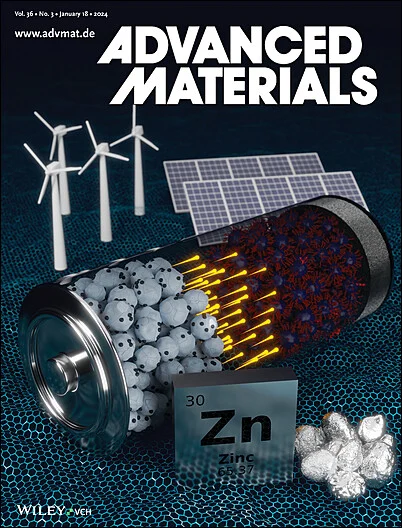Advanced Electrode Materials for Efficient Hydrogen Production in Protonic Ceramic Electrolysis Cells
IF 27.4
1区 材料科学
Q1 CHEMISTRY, MULTIDISCIPLINARY
引用次数: 0
Abstract
Protonic ceramic electrolysis cells (PCECs) exhibit superior proton conductivity under intermediate-temperature operation (300–600 °C), emerging as a promising water electrolysis technology compared to traditional low-temperature proton-conducting polymer electrolysis and high-temperature oxygen ion-conducting oxide electrolysis. However, the sluggish kinetics of the oxygen evolution reaction (OER) and electrode instability in PCECs hinder their large-scale development. This review highlights recent advancements in PCEC technology, emphasizing its thermodynamic and kinetic advantages, the categorization of advanced electrode materials, and material regulation strategies, including chemical doping, microstructural engineering, and multiphase design to improve their catalytic performance and stability. Additionally, the current challenges are discussed and future research directions are outlined for advanced PCEC electrode materials. By summarizing recent advancements in electrode materials and their optimization strategies, this review provides valuable insights into the rational design of efficient and stable electrode materials, advancing PCEC technology for green hydrogen production.

质子陶瓷电解电池高效制氢的先进电极材料
质子陶瓷电解电池(PCECs)在中温(300-600℃)条件下具有优异的质子导电性,与传统的低温质子导电聚合物电解和高温氧离子导电氧化物电解相比,是一种很有前途的水电解技术。然而,pcec的析氧反应(OER)动力学缓慢和电极不稳定性阻碍了其大规模发展。本文综述了PCEC技术的最新进展,强调了其热力学和动力学优势,先进电极材料的分类,以及材料调节策略,包括化学掺杂,微结构工程和多相设计,以提高其催化性能和稳定性。最后讨论了PCEC电极材料目前面临的挑战和未来的研究方向。本文综述了近年来电极材料及其优化策略的研究进展,为合理设计高效稳定的电极材料,推进PCEC技术的绿色制氢提供了有价值的见解。
本文章由计算机程序翻译,如有差异,请以英文原文为准。
求助全文
约1分钟内获得全文
求助全文
来源期刊

Advanced Materials
工程技术-材料科学:综合
CiteScore
43.00
自引率
4.10%
发文量
2182
审稿时长
2 months
期刊介绍:
Advanced Materials, one of the world's most prestigious journals and the foundation of the Advanced portfolio, is the home of choice for best-in-class materials science for more than 30 years. Following this fast-growing and interdisciplinary field, we are considering and publishing the most important discoveries on any and all materials from materials scientists, chemists, physicists, engineers as well as health and life scientists and bringing you the latest results and trends in modern materials-related research every week.
 求助内容:
求助内容: 应助结果提醒方式:
应助结果提醒方式:


